You
I know how frustrating it can get with all those assignments mate.
Nursing Being my main profession line, i have essential guides that are A graded, I am a very friendly person so don
- 4106
- 0
- 243
Community
- Followers
- Following
1492 Reviews received
4380 items
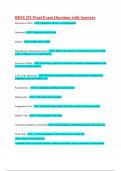
BIOS 251 Anatomy and Physiology 1 Final Exam Questions with Answers
Part of the skin that makes the strength and flexibility of the dermis? - ANS: Reticular Layer Gland that secretes oil - ANS: Sebacious gland Glands that produce cerumen - ANS: Ceruminous gland Glands that secrete sweat - ANS: Exocrine glands What cell type forms the strata of the epidermis? - ANS: Keratinocytes Abundant cell type in epidermis? - ANS: Keratinocytes What part of the skin is composed of keratinized stratified epithelium? - ANS: Epidermis Which layer of skin fo...
- Exam (elaborations)
- • 11 pages •
Part of the skin that makes the strength and flexibility of the dermis? - ANS: Reticular Layer Gland that secretes oil - ANS: Sebacious gland Glands that produce cerumen - ANS: Ceruminous gland Glands that secrete sweat - ANS: Exocrine glands What cell type forms the strata of the epidermis? - ANS: Keratinocytes Abundant cell type in epidermis? - ANS: Keratinocytes What part of the skin is composed of keratinized stratified epithelium? - ANS: Epidermis Which layer of skin fo...
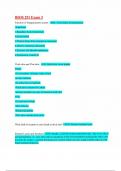
BIOS 251 Anatomy and Physiology Exam 3 updated 2024 with correct answers
Identify which bones form by intramembranous ossification - ANS: -flat bones of the skull -most of the facial bones -mandible (lower jawbone) -medial part of the clavicle (collar bone) Describe the process of endochondral ossification - ANS: -Bones develop from cartilage models -Center of ossification first appears in diaphysis -Centers of ossification then develop in epiphyses Describe calcification of bones and identify when it occurs - ANS: -process in which calcium builds up in ...
- Exam (elaborations)
- • 14 pages •
Identify which bones form by intramembranous ossification - ANS: -flat bones of the skull -most of the facial bones -mandible (lower jawbone) -medial part of the clavicle (collar bone) Describe the process of endochondral ossification - ANS: -Bones develop from cartilage models -Center of ossification first appears in diaphysis -Centers of ossification then develop in epiphyses Describe calcification of bones and identify when it occurs - ANS: -process in which calcium builds up in ...
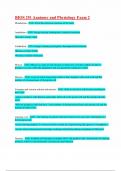
BIOS 251 Anatomy and Physiology Exam 2 updated 2024
areolar connective tissue - ANS: Glue that holds organs together Adipose(fat) connective tissue - ANS: Lipid storage in primary function fibrous connective tissue - ANS: Bundles of strong collagen fibers; e.g. tendons bone connective tissue - ANS: Matrix is calcified; function is support and protection cartilage connective tissue - ANS: Matrix is consistency of gristle-like gel; chondrocyte is cell type blood connective tissue - ANS: Matrix is fluid; functions are transportation a...
- Exam (elaborations)
- • 12 pages •
areolar connective tissue - ANS: Glue that holds organs together Adipose(fat) connective tissue - ANS: Lipid storage in primary function fibrous connective tissue - ANS: Bundles of strong collagen fibers; e.g. tendons bone connective tissue - ANS: Matrix is calcified; function is support and protection cartilage connective tissue - ANS: Matrix is consistency of gristle-like gel; chondrocyte is cell type blood connective tissue - ANS: Matrix is fluid; functions are transportation a...

BIOS 251 Anatomy and Physiology Exam 2 Preparation Questions with Correct Answers
First and longest phase of mitosis, during which the chromosomes become visible and the centrioles separate and take up positions on the opposite sides of the nucleus - ANS: Prophase Second phase of mitosis, during which the chromosomes line up across the center of the cell - ANS: Metaphase The third phase of mitosis, during which the chromosome pairs separate and move toward opposite poles - ANS: Anaphase The final phase of cell division, between anaphase and interphase, in which the c...
- Exam (elaborations)
- • 24 pages •
First and longest phase of mitosis, during which the chromosomes become visible and the centrioles separate and take up positions on the opposite sides of the nucleus - ANS: Prophase Second phase of mitosis, during which the chromosomes line up across the center of the cell - ANS: Metaphase The third phase of mitosis, during which the chromosome pairs separate and move toward opposite poles - ANS: Anaphase The final phase of cell division, between anaphase and interphase, in which the c...
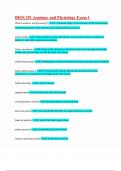
BIOS 251 Anatomy and Physiology Exam 1 updated 2024 with Correct Answers
What is anatomy and physiology? - ANS: • Anatomy-study of the structures of the human body. • Physiology-Study of the function and working of those structures. Define buffer - ANS: form chemical systems that absorb excess acids or bases to maintain a relatively stable pH, maintains homeostasis Define metabolism - ANS: refers to the whole sum of reactions that occur throughout the body within each cell and they provide the body with energy. Define homeostasis - ANS: Maintaining a st...
- Exam (elaborations)
- • 10 pages •
What is anatomy and physiology? - ANS: • Anatomy-study of the structures of the human body. • Physiology-Study of the function and working of those structures. Define buffer - ANS: form chemical systems that absorb excess acids or bases to maintain a relatively stable pH, maintains homeostasis Define metabolism - ANS: refers to the whole sum of reactions that occur throughout the body within each cell and they provide the body with energy. Define homeostasis - ANS: Maintaining a st...

BIOS 251 Exam 1 Preparation Questions with Answers
The study of human structure - ANS: Anatomy The study of human function - ANS: Physiology A tendency for organisms to maintain a balanced or constant internal state - ANS: Homeostasis A state of balance - ANS: Equilibrium Consequences of homeostatic imbalance - ANS: Illness or death Thermoregulation Process - ANS: A feedback loop in which a system responds to a change by reversing that change, or by decreasing the rate at which the change is occurring. (Ex. thermoregulation) -...
- Exam (elaborations)
- • 31 pages •
The study of human structure - ANS: Anatomy The study of human function - ANS: Physiology A tendency for organisms to maintain a balanced or constant internal state - ANS: Homeostasis A state of balance - ANS: Equilibrium Consequences of homeostatic imbalance - ANS: Illness or death Thermoregulation Process - ANS: A feedback loop in which a system responds to a change by reversing that change, or by decreasing the rate at which the change is occurring. (Ex. thermoregulation) -...
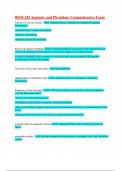
BIOS 255 Anatomy and Physiology Comprehensive Exam with Verified Answers
What does a synergistic muscle do - ANS: also called fixators, act around a joint to help the action of an agonist muscle. (iliacus, psoas major, and rectus femoris) hamstring group - ANS: biceps femoris, semitendinosus, semimembranosus sodium-potassium ion - ANS: Neuron has a negative charge at rest. Slightly positive charge sodium ions on the outside. During the firing, sodium ions rush into the axon causing depolarization. Potassium ions rush out of the axon causing it to return to i...
- Exam (elaborations)
- • 7 pages •
What does a synergistic muscle do - ANS: also called fixators, act around a joint to help the action of an agonist muscle. (iliacus, psoas major, and rectus femoris) hamstring group - ANS: biceps femoris, semitendinosus, semimembranosus sodium-potassium ion - ANS: Neuron has a negative charge at rest. Slightly positive charge sodium ions on the outside. During the firing, sodium ions rush into the axon causing depolarization. Potassium ions rush out of the axon causing it to return to i...
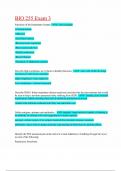
BIOS 255 Anatomy and Physiology Exam 3 updated with Verified Answers
Describe the control of the dorsal respiratory group neurons on respiration - ANS: -Modifies the rate and depth of breathing -controls the basic rhythm of breathing by triggering inspiratory impulses -neurons send impulses to the motor nerves of diaphragm and external intercostal muscles Describe the processes of exhalation and inhalation during eupnea (and identify the muscles involved). - ANS: -inspiratory neurons fire for about 2 sec, expiratory neurons fire for about 3 sec -Normal quie...
- Exam (elaborations)
- • 9 pages •
Describe the control of the dorsal respiratory group neurons on respiration - ANS: -Modifies the rate and depth of breathing -controls the basic rhythm of breathing by triggering inspiratory impulses -neurons send impulses to the motor nerves of diaphragm and external intercostal muscles Describe the processes of exhalation and inhalation during eupnea (and identify the muscles involved). - ANS: -inspiratory neurons fire for about 2 sec, expiratory neurons fire for about 3 sec -Normal quie...
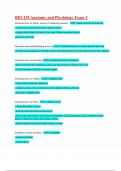
BIOS 255 Anatomy and Physiology Exam 2 Updated with Verified Answers
List and identify all the factors that are important in ensuring adequate venous return to the heart - ANS: -A strongly beating heart -An adequate arterial blood pressure -Valves in the veins -Pumping action of skeletal muscles as they contract -Changing pressures in the chest cavity caused by breathing Describe the functions of plasma proteins that remain in the blood with regards to capillary filtration - ANS: external jugular vein function - ANS: drains blood from the facial region...
- Exam (elaborations)
- • 10 pages •
List and identify all the factors that are important in ensuring adequate venous return to the heart - ANS: -A strongly beating heart -An adequate arterial blood pressure -Valves in the veins -Pumping action of skeletal muscles as they contract -Changing pressures in the chest cavity caused by breathing Describe the functions of plasma proteins that remain in the blood with regards to capillary filtration - ANS: external jugular vein function - ANS: drains blood from the facial region...
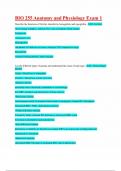
BIOS 255 Anatomy and Physiology Exam 1 updated 2024 with Verified Answers
Refractory period in the action potential of cardiac muscle cells. - ANS: -absolute refractory period of 250 ms -Prevents wave summation and tetanus which would stop the pumping action of the heart synovial fluid functions - ANS: -nourishes the articular cartilages -removes their wastes -makes movements at synovial joints almost friction-free pleural fluid function - ANS: -acts as a lubricant that enables the lungs to expand and contract with minimal friction pericardial fluid functi...
- Exam (elaborations)
- • 9 pages •
Refractory period in the action potential of cardiac muscle cells. - ANS: -absolute refractory period of 250 ms -Prevents wave summation and tetanus which would stop the pumping action of the heart synovial fluid functions - ANS: -nourishes the articular cartilages -removes their wastes -makes movements at synovial joints almost friction-free pleural fluid function - ANS: -acts as a lubricant that enables the lungs to expand and contract with minimal friction pericardial fluid functi...

Pharmacotherapeutics for Advanced Practice Nurse Prescribers 5th Edition Woo Robinson Test Bank / Pharmacotherapeutics for Advanced Practice Nurse Prescribers 5th Edition Woo Robinson Test Bank (ALL CHAPTERS, complete questions and answers)
Electrical Level 3 Module 1 Load Calculations and Branch Feeder Circuits Quiz
PACO 501 - Pastoral Counseling Research Paper: A Select Issue In Pneumatology: The Works Of The Holy Spirit.
Property & Casualty Insurance License Test Updated 2022 > Pass the P&C Insurance Licensing Exam With Flying Colors.
Electrical Level 3 Module 1 Load Calculations and Branch Feeder Circuits Quiz